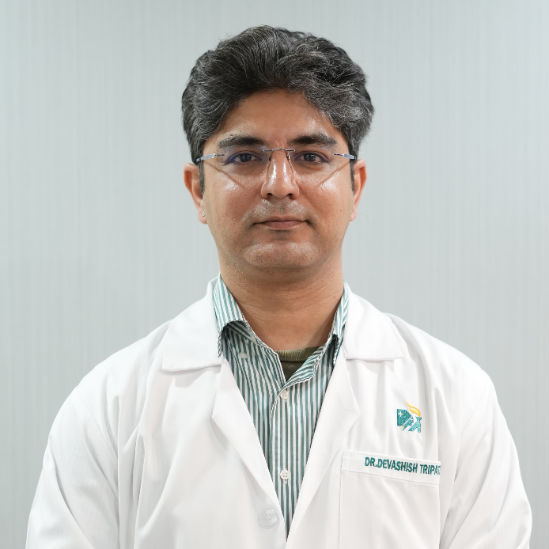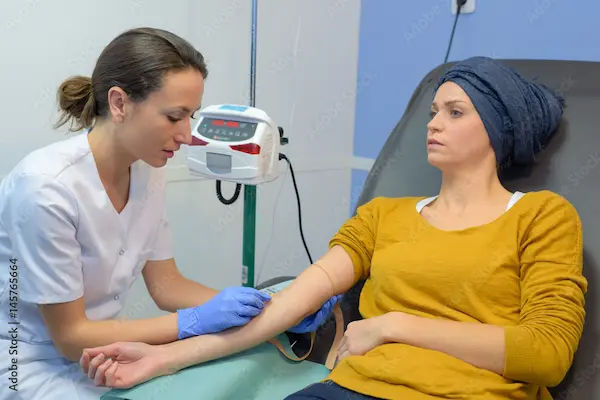Pancreatic Cancer Symptoms
Learn about the symptoms of pancreatic cancer, including digestive issues, pain, and jaundice. Understand the importance of early detection, risk factors, and diagnostic methods for effective management and treatment of this serious condition.

Written by Dr Sonia Bhatt
Last updated on 13th Jan, 2026
Pancreatic Cancer Symptoms: How to Deal with This Condition
Amongst various life-threatening conditions, pancreatic cancer is known as a silent disease since its symptoms do not appear prominently until it reaches the later stages. This severe medical condition develops in the pancreas, a vital organ located much deeper within the abdomen, responsible for the catabolism of food and regulation of blood sugar levels.
It is the severe lack of visible symptoms which makes the case so difficult at the early stage of pancreatic cancer. However, recognising the early signs can significantly increase the chances of successful treatment and better survival rates. This article covers the symptoms of pancreatic cancer and the approaches used by doctors to handle this condition seamlessly.
Overview and Role of the Pancreas in the Body
The pancreas is located in front of the spine behind the stomach, spanning across the upper abdomen. It plays an important role in digestion as well as in controlling blood sugar levels in the body. Like a digestive organ, the pancreas also secretes enzymes into the small intestine, which assist in food digestion.
These enzymes include amylase, lipase, and proteases for carbohydrate, fat, and protein digestion, respectively. The pancreas is also essential in glucose balance. It secretes two hormones: insulin, which lowers blood sugar and glucagon, which raises blood sugar, ensuring the balance of sugar in the blood.
Due to its location, pancreatic cancer sometimes goes undetected until it has advanced, as it is hard to feel any abnormalities through physical examination.
Common Symptoms of Pancreatic Cancer
There are no early signs of pancreatic cancer. Symptoms typically appear when the tumour affects other parts of the digestive system. The common symptoms of pancreatic cancer can include:
Eating Disorders
Since the pancreas is a vital organ for the process of digestion, several digestive disorders may develop. Nausea, vomiting, and indigestion are some of the common signs and symptoms. The inability of the pancreas to secrete enough of its enzymes may cause difficulty in food breakdown processes, which leads to the feeling of fullness whenever one eats.
Pain in the Abdomen or Back
People suffering from pancreatic cancer also suffer from pain in the upper part of the abdomen or around the lower back area. This pain may either be aching or sharp and may even intensify after eating. It may also radiate to the back after the tumour has expanded and begun to compress other associated tissues around the nerves.
Sudden Unexplained Weight Loss
Another indicator of pancreatic cancer is losing body weight without a known cause. The primary reason is the body's reduced ability to process food and absorb essential nutrients, combined with the high energy demands caused by cancer.
Increased Eating Disorders
One of the cancer symptoms which advanced-stage cancer patients experience is a lack of desire to eat, which eventually leads to significant weight loss. Several reasons may contribute to this condition, for example, nausea, pain, or a general sense of feeling sick due to cancer.
Fatigue
Many individuals with pancreatic cancer experience extreme fatigue, even after adequate sleep. This disorder can result from the body’s immune response to cancer or from malnutrition and weight loss.
New-onset Diabetes
The pancreas is responsible for regulating blood sugar, so pancreatic adenocarcinomas can impair this ability. New-onset diabetes in people with no pre-existing risk factors can be a warning sign.
Bloating and Indigestion
The cancer can disrupt the digestive enzymes that the pancreas produces. These symptoms might be accompanied by typical digestive ailments, but if they worsen, it could mean there are more serious problems hidden beneath.
Stomach Upset and Indigestion
Impaired production of digestive enzymes by the pancreas can lead to bloating, excessive gas, and indigestion. If these symptoms last longer or worsen, immediate medical intervention is necessary.
Change in Stool Colour and Consistency
Pancreatic cancer can lead to stools that may appear pale, oily, or even float because of a deficiency of digestive enzymes. This condition is called steatorrhea, and it can bear a very strong odour. Dark-coloured stools may also occur if there is bleeding in the digestive tract.
Consult Top Doctors for Your Symptoms
How is Jaundice Connected to Pancreatic Cancer?
Jaundice is the yellowing of the skin and eyes and is usually caused by an obstruction in the bile duct. It is related to cancer of the pancreas as it prevents proper drainage of bile from the liver. The accumulation of bilirubin in the blood leads to the yellow tint.
Jaundice can seem to be a warning sign of pancreatic cancer, especially if it showcases symptoms like pale stools and dark urine. The blockage can also cause itching because bile salts can irritate the skin. It usually signifies that a tumour is located in the head of the pancreas and is probably compressing the bile duct.
Diagnostic Methods for Pancreatic Cancer
The process of diagnosing pancreatic cancer includes several tests. These tests are used to determine if the disease exists and to evaluate how much it has progressed. The approaches include:
General Tests: Blood tests, physical examinations, and X-rays are often the first measures that are performed to look for indications of pancreatic cancer.
Ultrasound: Sound waves are used in this imaging technique to envision the pancreas and ascertain the presence of tumours and other irregularities.
Computed Tomography (CT) Scan: This scan closely examines the pancreas and other body parts, facilitating tumour identification and staging.
Magnetic Resonance Imaging (MRI): A CT scan is similar to an MRI in that the latter generates a clear and detailed image of the pancreas. It is particularly useful for further investigation.
Laparoscopy: This technique helps examine the pancreas and adjoining parts by inserting a thin tool through the abdomen.
Endoscopy: This is done by mildly inserting the tube through the throat along with the camera for direct viewing of the pancreas.
Biopsy: For the purpose of evaluation, a biopsy can be performed, which entails the use of a thin needle to obtain a small sample from the pancreatic tissue.
Get Tested for Pancreatic Cancer
Risk Factors Contributing to Pancreatic Cancer
Individuals must be cautious about the risk factors mentioned below contributing to pancreatic cancer:
Smoking cigarettes, cigars, and other tobacco products
Exposure to certain chemicals, including pesticides and petrochemicals
Being overweight, especially if the extra weight is around the waist
Chronic pancreatitisHaving diabetes, particularly Type 2 diabetes
Genetic chronic pancreatitis inherited from parents due to gene mutations
Hereditary syndromes involving gene mutations, like BRCA1 (Breast Cancer Gene 1) or BRCA2 (Breast Cancer Gene 2), passed from parent to child
Conclusion
Pancreatic cancer is a challenging disease that needs early detection for successful treatment. Identifying pancreatic cancer symptoms and consulting a healthcare professional can significantly enhance treatment success. Besides, regular check-ups and being mindful of bodily changes are essential for managing and possibly preventing this serious condition.
Consult Top Oncologists
Consult Top Doctors for Your Symptoms

Dr. Amit Choraria
Surgical Oncologist
18 Years • MBBS, MS (Surgery) Fellow, Surgical Oncology, Tata Medical Center (FSO) Fellow, European Board of Surgery (Surgical Oncology) (FEBS) Fellow, Minimal Access Surgery (FMAS) Fellow, Indian Association of Gastrointestinal Endosurgeons (FIAGES) UICC Fellow, Royal Marsden NHS, London, UK Visiting Scholar, Plastic Reconstructive Surgery, CGMH, Taiwan Fellow, Robotic Surgical Oncology, Vattikuti Foundation, USA
Kolkata
Apollo Multispeciality Hospitals , Kolkata, Kolkata
(75+ Patients)

Dr. Sanchayan Mandal
Medical Oncologist
17 Years • MBBS, DrNB( MEDICAL ONCOLOGY), DNB (RADIOTHERAPY),ECMO. PDCR. ASCO
Kolkata
MCR SUPER SPECIALITY POLY CLINIC & PATHOLOGY, Kolkata

Dr.sanchayan Mandal
Medical Oncologist
17 Years • MBBS, DrNB( MEDICAL ONCOLOGY), DNB (RADIOTHERAPY),ECMO. PDCR. ASCO
Kolkata
Dr. Sanchayan Mandal Oncology Clinic, Kolkata

Dr Devashish Tripathi
Radiation Specialist Oncologist
20 Years • MBBS, PLAB, MRCP (UK)- General Medicine, FRCR (Oncology), Certificate of Completion of Training (CCT)- Clinical Oncology
Delhi
Apollo Hospitals Indraprastha, Delhi

Dr. Sandeep Muzumder
Radiation Specialist Oncologist
21 Years • MBBS (JIPMER, Pondicherry), MD (AIIMS, New Delhi)
Bhubaneswar
Apollo Hospitals Old Sainik School Road, Bhubaneswar
Consult Top Oncologists

Dr. Amit Choraria
Surgical Oncologist
18 Years • MBBS, MS (Surgery) Fellow, Surgical Oncology, Tata Medical Center (FSO) Fellow, European Board of Surgery (Surgical Oncology) (FEBS) Fellow, Minimal Access Surgery (FMAS) Fellow, Indian Association of Gastrointestinal Endosurgeons (FIAGES) UICC Fellow, Royal Marsden NHS, London, UK Visiting Scholar, Plastic Reconstructive Surgery, CGMH, Taiwan Fellow, Robotic Surgical Oncology, Vattikuti Foundation, USA
Kolkata
Apollo Multispeciality Hospitals , Kolkata, Kolkata
(75+ Patients)

Dr. Sanchayan Mandal
Medical Oncologist
17 Years • MBBS, DrNB( MEDICAL ONCOLOGY), DNB (RADIOTHERAPY),ECMO. PDCR. ASCO
Kolkata
MCR SUPER SPECIALITY POLY CLINIC & PATHOLOGY, Kolkata

Dr.sanchayan Mandal
Medical Oncologist
17 Years • MBBS, DrNB( MEDICAL ONCOLOGY), DNB (RADIOTHERAPY),ECMO. PDCR. ASCO
Kolkata
Dr. Sanchayan Mandal Oncology Clinic, Kolkata

Dr Devashish Tripathi
Radiation Specialist Oncologist
20 Years • MBBS, PLAB, MRCP (UK)- General Medicine, FRCR (Oncology), Certificate of Completion of Training (CCT)- Clinical Oncology
Delhi
Apollo Hospitals Indraprastha, Delhi

Dr. Sandeep Muzumder
Radiation Specialist Oncologist
21 Years • MBBS (JIPMER, Pondicherry), MD (AIIMS, New Delhi)
Bhubaneswar
Apollo Hospitals Old Sainik School Road, Bhubaneswar
Get Tested for Pancreatic Cancer
₹1679(₹4197)60% off




